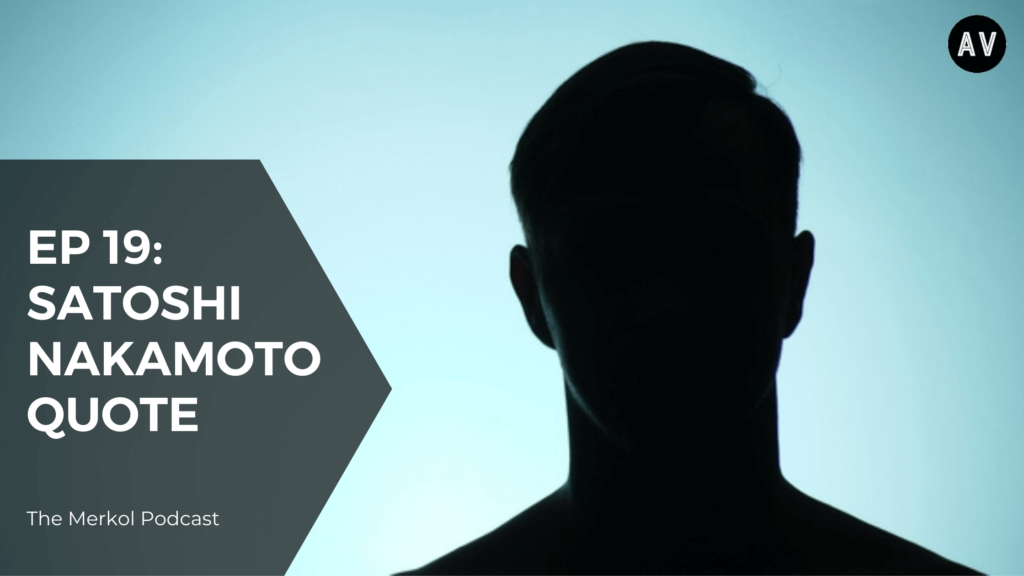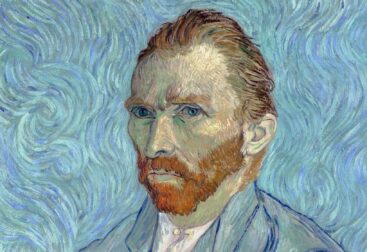In this episode of the Merkol Podcast, we analyzed the Satoshi Nakamoto Quote. The headline did not have enough place for the entire quote so here is the full one. It goes:
“The root problem with conventional currency is all the trust that’s required to make it work. The central bank must be trusted not to debase the currency, but the history of fiat currencies is full of breaches of that trust. Banks must be trusted to hold our money and transfer it electronically, but they lend it out in waves of credit bubbles with barely a fraction in reserve. We have to trust them with our privacy, trust them not to let identity thieves drain our accounts.”
Satoshi Nakamoto Quote

In this post you will find
Who is Satoshi Nakamoto?
Satoshi Nakamoto is the anonymous name used by the creators of the Bitcoin cryptocurrency.
Although the name Satoshi Nakamoto is often associated with Bitcoin, the real person who bears the name has never been identified, leading many to speculate that it is a pseudonym for a person or group of persons with a different identity.
In the 2008 financial crisis, the banks and people of power were scrambling to protect/bail out their so-called ‘financial institutions’ instead of figuring out a solution for its citizens. On Oct 31, 2008, Satoshi Nakamoto released the first Bitcoin white paper, you can read it here.
It is about 9 pages long with the first 5 pages talking about the concepts and the next 3 dealing with the implementation with one page for references. In these 9 pages, Satoshi built the first peer-to-peer trustless network, where the only thing you trust is the algorithm.
When Bitcoin’s first-ever block was mined, its creator (or creators), Satoshi Nakamoto, posted a message referencing a 2009 story by UK newspaper The Times. The message read:
“The Times 03/Jan/2009 Chancellor on brink of second bailout for banks.”
People may say it is complicated, the common person is finding it difficult to use it, etc but those 9 pages released on Halloween is the gateway to the future of finance where you will pay for your mistakes and you will be rewarded for your good work, there is no central authority to manipulate according to your wishes.
While several people have claimed to be Satoshi, the true identity has never been verified nor revealed. Given the price of BTC today, Satoshi would be a billionaire.
What does the Satoshi Nakamoto quote mean?
To make sense of why trust is involved and why Satoshi spoke about it, we all need to first understand money.
What is money?
There is a famous saying that ‘Money is the bubble that never pops.’
This statement is true in so many ways. Money is nothing but trust.
For example, a fruit seller sells apples. You want an apple so you go to that fruit seller. You can’t get it for free as the fruit seller is not running a charity. You need to offer him something.
In the earlier days, they used the barter system. You offer that seller a bag of rice in exchange for a dozen apples. The fruit seller sees value in a bag of rice and accepts it. Sounds good right? But imagine if 100 people want a dozen apples each, what would the seller do with 100 bags of rice? The alternative of offering him different things is not universal – all fruit sellers won’t accept the same things because each one’s needs are different.
So the people had to figure out a common medium of exchange that every seller accepts. The most important thing is that the buyer and seller should trust that the medium of exchange has value. If the seller does not believe it has value then he won’t accept it in exchange for his apples.
They also needed to figure out a medium that a certain object has perceived value across multiple societies and countries so that it facilitates easier trade and this will lead to more GDP and expansion.
Gold as a currency
Money is a device for moving value across time and space so gold is excellent at holding value across time. The chemical composition of gold also makes it valuable given that it cannot be replicated which would give the people incentive to mine more and more of it (making it worthless in the process).
Gold also ticks most boxes for all the attributes needed in a standard store of value. It served a variety of purposes and even today gold is still the closest we have come to a decent store of value.
But metals in general are pretty poor especially for a globalizing society, at expressing value across space. They are very heavy and difficult to move, expensive to secure.
This is when paper currency was introduced, by abstracting gold into a paper currency, we can increase its transact ability across space as long as it will be redeemable 1 for 1, one unit of currency is redeemed for one unit of gold. It maintained its ability to express value across time as well.
The Gold Standard
The value of a currency is directly related to the amount of gold reserves in the country and the rate at which they price their gold reserves. If the price of a gram of gold is 100, then the price of a currency would be 1/100. There are more intricacies involved depending on the state the country is in or the gold reserves they have.

The gold standard provided a guarantee. The gold standard signifies an agreement between society and its monetary institutions that the currency they spend and earn is a stand-in for gold. It guaranteed that the government would redeem any amount of paper money for its value in gold because the total money in circulation within the country is equivalent to the rate at which they price their gold reserves.
This ensures that if you collect all the paper currencies in that countries and take them to the bank, they would exchange all that currency for an equivalent amount of gold. Nothing more, nothing less. This ensures that the currency you have is backed by the gold reserves in the country.
Why was the gold standard discontinued?
There is a big explanation for this out there, but from what I understand is that the gold standard tied the hands of the governments in making bold expansionary moves (not that this is a bad thing). The gold standard prohibited the government from having more or less money in circulation than their gold reserves, so they cannot increase supply at times when they feel more money needs to be in circulation (which is not the answer to any problem, imo).
The only thing that was in the hands of the central authority was how they could price one unit of gold reserves. This does not offer a great deal of flexibility.
So the governments opted out of the gold standard and introduced a new method of valuing their currency or pricing that country’s currency against – Trust.
Trust in the government was not the only thing the currency was backed against. This gave the government lot of flexibility which they offloaded to banks in the form of lending licenses.
The banks which had this license can offer loans. They created multiple products which helped them lend better – ranging from home loans to education loans to loans to develop businesses. All this was done in a facade called as economic growth.
Money was lent to people, to businesses. There were short-term loans with low interest (money market) and long-term loans with high-interest rates (debt market).
Whenever a so-called financial institution (Bear Sterns) or a person (Vijay Mallya) with social standing needed money/bailout, the governments happily did it as their resources are not capped, they can print the money they use for the bailout in no time.
This was just the lack of opportunity cost that was forgotten to be included in the proposed monetary policy that involved trusting the governments.
For example, if you start a business and make a few decisions on how it will be run, then if all goes south, you and the other people who backed you incur the losses, not your customers. The same is not true when it comes to governments. They decide a financial plan or introduce a new bill and work out some expansion plan which will be paid with the help of the taxpayer’s money, if that plan does not work and if it goes all south then the repercussions trickle down by the same taxpayers in form of rising costs.
This was just an abuse of power.

This was the case for a pretty long time and somehow they managed to keep inflation to reasonable levels until they took this liberty for granted and decided that printing money is the answer to every economic problem the country faces. This leads to more money in circulation and eventually leads to inflation.
Why is inflation bad?
Imagine a scenario where the salary you get on the first day of the month loses half its value by the end of the month, what would you do? By losing half its value, an example would be, with your salary at the starting of the month you can buy 10 bags of rice, but by the end of the month with the same money you can only buy 5 bags of rice, what would you do?
You will rush to the supermarket to buy those 10 bags of rice your money is worth. Sounds like an awful zombie world scenario right? This was the case for Brazil during the 1980s and 1990s. Here is the full BBC article on the same: Brazil in Financial turmoil – BBC
In today’s world, this is the same scenario in countries like Venezuela, Zimbabwe, Sudan, Argentina, etc. Bad economic decisions lead to financial turmoil and the brunt of this is experienced by the wage workers.
Capping the supply of currency
If free reign over printing money is the root cause for all this then there should be some mechanism in place to cap the total supply of that currency.
Capping the supply of a currency is important for the above-mentioned reasons but then arises the question as to how much should the limit be. What is the magic number? 20 million, 4 million, 1 billion? The answer is there is no magic number.
A country can run on any amount of money, but it should be capped. When you make something scarce and increase the value of the economy/society where the currency is used then it naturally increases the value of the currency. Lays chips packet need not be 10 INR, it could go down to 3 INR as well if INR’s value keeps increasing gradually. If the same value of goods you can get for 10 INR, could be got for 3 INR then it solves multiple problems for the citizens of that country.
Most importantly having long-term thinking embedded into everyday spending.
Long term time horizons for people
If the value of the money you earn today will have the same value or have a higher value in another 5 years’ time then you can plan for the longer term. If you live in Zimbabwe, then the money you earn is essentially lost half its value in a week, in that case, the average person cannot think long term as you need to think about survival literally every day and I am not exaggerating.

You may ask what are the implications of long-term thinking. If the money he earns has a value that does not reduce over a longer period then he can plan his life for at least another 5 months. And in that term, he can look into other avenues, possible investment opportunities which could help him even better his life.
If all a person thinks from waking up to going back to sleep is how to get the next meal then how can he think of improving his life for the better?
Don’t underestimate the power of long-term thinking.
Returning to gold standard
Now many of you are thinking if going back to the gold standard is beneficial. Let me tell you now that there could be multiple repercussions starting with the government fixing on a value for a unit of gold. And I am personally fed up of a central authority especially after I have seen the possibilities of what a free market is capable of.
This is exactly what Satoshi Nakamoto is saying when he claimed that the root cause is the trust needed in the system to make the conventional currencies work. Trust varies from person to person it is not quantifiable and thus we need
Introducing – Bitcoin.
Closing
Bitcoin is essentially augmenting a technology that solves our economic problems which is chosen by the free market for over 10 years. It is making money transactable across space and time. So, hats off, Satoshi for implementing something that is hard for most people to even conceptualize.
More on Bitcoin in a future episode with a different quote that stresses the impact of Bitcoin.
Podcast
I have recorded a podcast on this Satoshi Nakamoto Quote. But it is in Tamil. If you know the language, then please do listen to this. Do let me know if you like it. Here is the link:







